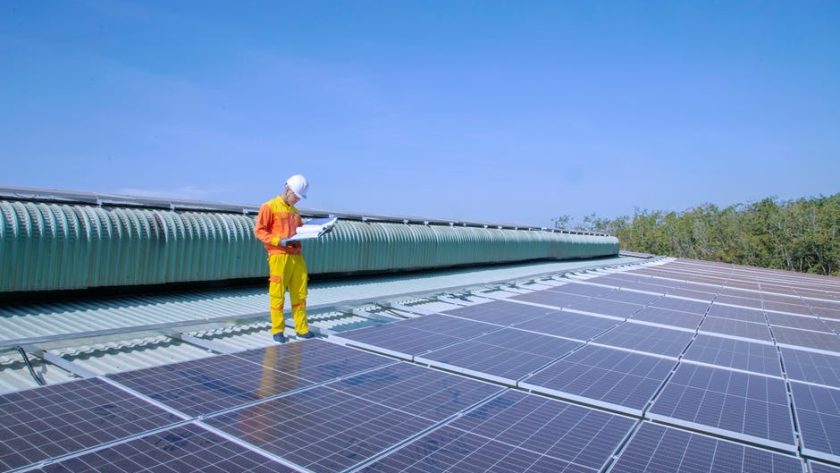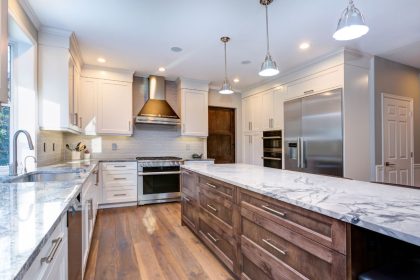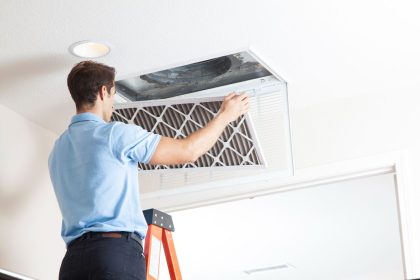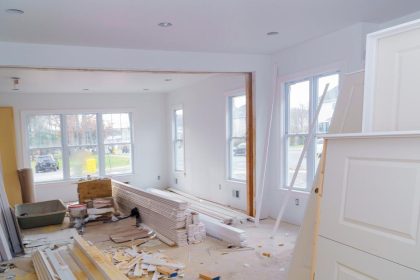Is it finally time to install solar panels on your home?
Solar panel installation is rising today, with the number of facilities doubling in the last few years. You’ve been waiting for the day you could drop your electricity bills and hop on that bandwagon.
But with numbers like that, you need help figuring out how to get started or if it’s even the right time to do so.
Don’t worry; we’ve got you covered. Here’s everything you need to know about installing solar panels in your home.
Keep reading to learn more!
Roof Condition
The roof condition is critical when installing solar panels in your home. If your roof is in good condition, with cracks, loose tiles, or worn-out shingles, the installation technicians will need help to mount the solar system.
If there are any areas of deterioration, you need to repair the roof before they install the solar panel. If your roof is new, inspect for any physical damage, including cracked tiles or bent flashings.
To ensure a successful installation and solar system, ensure your roof is in excellent condition before contacting an installer.
Solar Panel Type
Monocrystalline and polycrystalline are the most popular panels and offer the highest efficiency, but they are also the most expensive. Thin film panels provide the lowest efficiency and cost but need more installation space and a more extended return on investment.
Hybrid solar panels are a good option because they combine monocrystalline and thin film panels, providing the highest efficiency and lower-than-average cost solar energy. Flexible solar panels offer even better efficiency but give the highest price tag.
When installing solar panels in your home, it is essential to research each type and make the best decision for your individual needs.
System Size
When determining the optimal system size for your home, assessing how much energy you use and how much it costs is essential. The size of the system is typically determined by the amount of energy required and the available area for installation.
A typical solar panel system consists of solar panels, an inverter, and a racking system to mount the panels onto your roof. The size and number of solar panels will depend on the amount of energy you use and the size of the available area for installation.
As the size of the system increases, the more energy it will produce. Generally speaking, the larger the solar panel system, the lower your cost per watt, as larger systems often have cost-saving economies of scale.
Furthermore, the higher the wattage, the more electricity the system will produce, and the more you will enjoy energy savings.
Energy Storage
Solar energy is an excellent solution for energy storage. By installing solar panels in your home, you can create a renewable energy source that will provide electricity for your house.
Solar panels store solar power from the sun in DC (direct current) or AC (alternating current). You can use this energy right away or keep it for later use.
Solar batteries are also an excellent choice for energy storage as they allow you to store excess electricity generated during the day to use at night. This eliminates the need to buy extra electricity from your utility company.
Energy Consumption Habits
Solar energy can reduce energy costs and carbon emissions while making energy use more efficient. With solar panels, you’ll use less coal and natural gas energy, both polluting sources.
You can save money on energy costs and make your house even more energy efficient by making it more energy efficient. When placed, your solar panel system can affect how much energy you use.
You can also use panels to ensure that your energy-efficient equipment, like a clothes washer or refrigerator, uses the least energy possible.
Local Regulations and Permits
Depending on where they live, people may need permits or even help from a professional to get the correct paperwork. You will need to fill out an application for a permit and paperwork about the zoning of the land.
Most cities and towns have safety and zoning rules that say you must install solar panels. Before installing solar panels, you must determine the area’s laws and regulations.
Some solar panel companies may say yes to a homeowner’s request to put solar panels. But there may be some limits. Before installing solar panels, you need to think about these rules and permits. If you don’t, you could get in trouble or have to pay for things you didn’t plan.
Solar Panel Lifespan
It’s essential to consider the solar panel lifespan when installing solar panels. The panels usually have an expected life of around 25 years, but these can vary depending on the manufacturer.
The life of the solar panels also depends on how you take care of them and the environment they are situated in. To maximize the lifespan of solar panels, clean them, protect them from hurricane-force winds, and place them in a location that gets a good amount of sun all year round.
Taking good care of the solar panels will ensure their long lifespan, allowing your home to reap the benefits of green energy for many years.
Orientation and Tilt
When it comes to solar panels, the right way to set them up is so that they get the most sunlight during daylight hours. The tilt of your solar panels is also significant, so you should check your local laws to determine the best tilt angles for your area.
To make the most energy, the tilt of your solar panels should be close to but not more than your latitude. Knowing the area latitude can also help you determine how your home’s solar panels should be set up.
With the right direction and tilt, you can ensure that your home’s solar panels produce the most energy.
Shading Analysis
This analysis evaluates the amount of shade cast onto the solar panel system during different times of the day and other times of the year. Having data such as this will help you size your solar panel system and ensure that you can maximize solar energy production.
This analysis uses precise measurement tools, such as Google Earth and Solar Path Finder, to ensure you know exactly how much energy you can harvest from the sun. Having the most accurate data possible before installing solar panels in your home is vital.
Solar Panel Maintenance
Regular maintenance of solar panels can increase the lifespan of the system. It can save you money in the end. It’s essential to clean the panels to ensure optimal performance and to check the electrical connections at least once a year.
You should also remove any snow or foliage from the panels to provide their best performance. You should also check your solar system’s performance and contact your installer if you notice any changes in the version.
By ensuring your solar system is maintained and running, you can rest assured that you’re taking the best care of your home and environment.
System Monitoring
System tracking lets people measure how much electricity their solar panels produce and track how well they use energy. This will help people know how well their solar panels are working and how much energy they are making.
System monitoring can also tell if there are any problems with the solar cells. This lets people find issues and fix them before they cause much damage.
System monitoring is also an important safety measure because it can warn you of possible dangers, like panels getting too hot. System monitoring is essential to solar installation when you put solar panels in your home. Homeowners should make sure they have a plan for monitoring in place before and after the installation.
Solar Incentives
Incentives vary from state to state, so it pays to research the incentives available in your form before you buy a solar energy system. Federal incentives, such as the residential investment tax credit, can cover up to 30% of the system cost.
Many states and local governments offer refunds and net metering, which lets you trade any extra energy you make for credits that you can use to pay off your electric bill. Solar Purchase Power Agreements also allow you to buy solar energy at a set rate and use it without paying for it all at once.
Solar Financing Options
Solar financing relies on third-party owners and investors to provide the upfront capital to buy and install the array. So, you’ll need to research many companies to find the best rate and loan terms. Leasing options may be more flexible than buying, allowing you to use third-party solar technology with no money out of pocket.
While there can be risks associated with financing, researching and seeking out competitive offers can allow you to make an informed decision and get the solar panels you need for your home with minimal stress.
Insurance Coverage
Your homeowner’s insurance policy should cover the damage to your solar panels and the surrounding property. If a tree falls on the boards, fire damage, or any other act of nature-related damage, this should all be covered.
You may need to increase your coverage if you decide to make solar panels your primary energy source for your home. Also, it is essential to ask your insurer if they consider solar panels to be an “attached” or “unattached” feature of your home. Different coverage may apply to the two other options.
Maintenance Warranties
Many solar panel providers offer maintenance warranties to cover the cost of repairs and replacements. This warranty can be essential when deciding whether to install solar panels.
The extent of the coverage available with a warranty varies depending on the provider. Still, they cover issues such as panel damage and repairs to orientation hardware. It needs to read through the terms of the warranty, as it can save time and money should a problem occur.
Installer Credentials
The installation of solar panels for your home is an involved process that requires technical knowledge and special tools. You’ll want to ensure that you hire an experienced and trusted installer for your project.
Before you agree to a deal, ask the installer for credentials such as licenses, certifications, and insurance coverage. This will give you peace of mind that your solar panel installation is handled by an experienced professional who adheres to all city, state, and federal laws and local building codes.
Additionally, these credentials should give you an idea of the quality of their work and assure that the solar panel system has been properly installed.
Solar Panel Recycling
As solar panel technology advances, it is essential to consider recycling solar panel panels when they are no longer effective. Solar panel recycling allows for toxic metals in the discussions to be safely taken care of to prevent them from ending up in landfills.
It allows for recovering components used in future solar panel production. Some companies even specialize in solar panel recycling to assist with the process.
Community Solar Options
If you don’t own your home or don’t have enough space, you may be better off with a community solar choice. Customers can sign up for solar gardens, which can be set up anywhere, from public buildings to open fields.
Each panel usually makes about 1.5 kilowatts of solar energy; customers get a share of the power. This can be a much easier and cheaper way of providing solar energy than putting panels on your home.
Community solar farms also have other perks, like making clean, renewable energy without pollution or noise. They are an important part of the push for renewable energy. They can be essential in making towns more self-sufficient.
Guide When Installing Solar Panels
Installing solar panels in your home is a great way to save on energy bills and help the environment. It requires pre-planning and research, but in the end, you can expect to save money and be a part of a greener future.
Do your research and compare quotes to get the best deal on your solar panel installation, and start saving today! You can access various tax credits, grants, and other incentives with the correct information.
If you need any other home improvement information, look at our blog.





